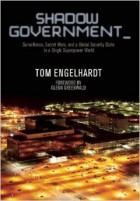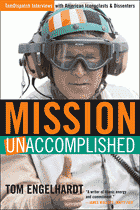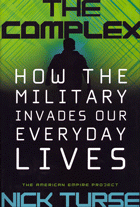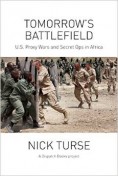[Note for TomDispatch Readers: With this evening’s post, TomDispatch closes for a week. We’ll be back ready to roll in this increasingly mad world of ours on September 4th. Meanwhile, keep in mind that signed, personalized copies of works like historian Alfred McCoy’s hit Dispatch Book, In the Shadows of the American Century: The Rise and Decline of U.S. Global Power, and my own A Nation Unmade by War are still available for a $100 contribution to this site ($125 if you live outside the U.S.). Just check out our donation page for the full list of what we’re offering. And a final end-of-summer reminder: this is the perfect moment to read a gripping piece of fiction, so get your hands on Beverly Gologorsky’s powerful new Dispatch novel, Every Body Has a Story, a rare and moving look at this country as the Great Recession hit. Of it, Pulitzer Prize-winning novelist Elizabeth Strout says simply, “What a book!” And it’s still available at half-price to TD readers at the Haymarket Press website by clicking here. Tom]
If I had to pick a single moment when I grasped that we were on a new surveillance planet, it would have been the release of the stunning revelations of Edward Snowden, the former National Security Agency contractor now in exile in Vladimir Putin’s Russia (and if there isn’t irony in that, please tell me what your definition of irony is). Those revelations seemed to fit all too well with the then-developing picture of twenty-first-century America. You know, the country with those black sites spread around the planet; whose top government officials had “enhanced interrogation techniques” (aka torture) demonstrated to them in the White House (and then authorized their use on actual human beings across that same planet); a country running a series of global kidnapping operations, placing its trust in secret courts, and thoroughly committed not just to the large-scale surveillance of populations, its own included, but to pursuing any whistleblower like Snowden who might want to tell us what was going on.
Back in 2013, when it came to Snowden, I began a piece I called “How to Be a Rogue Superpower” this way: “It’s hard even to know how to take it in. I mean, what’s really happening? An employee of a private contractor working for the National Security Agency makes off with unknown numbers of files about America’s developing global security state on a thumb drive and four laptop computers, and jumps the nearest plane to Hong Kong. His goal: to expose a vast surveillance structure built in the shadows in the post-9/11 years and significantly aimed at Americans. He leaks some of the documents to a columnist at the British Guardian and to the Washington Post. The response is unprecedented: an ‘international manhunt’ (or more politely but less accurately, ‘a diplomatic full court press’) conducted not by Interpol or the United Nations but by the planet’s sole superpower, the very government whose practices the leaker was so intent on exposing.”
In describing a government that was heading into "the shadows” in a way that would have left the founding fathers -- those ancient checks-and-balances guys -- horrified, I concluded: “It’s eerie that some aspects of the totalitarian governments that went down for the count in the twentieth century are now being recreated in those shadows. There, an increasingly ‘totalistic’ if not yet totalitarian beast, its hour come round at last, is slouching toward Washington to be born, while those who cared to shine a little light on the birth process are in jail or being hounded across this planet.”
And keep in mind that this was years before Donald Trump entered the Oval Office or any of us quite realized that what TomDispatch regular and private investigator Judith Coburn calls “surveillance capitalism,” as well as a planet of hackers, would join that government in creating an unprecedented surveillance culture, one that leaves all of us exposed. Honestly, I’d like to see the novel that George Orwell would write 34 years after 1984. In the meantime, I’ll settle for the vision of our world offered by one private investigator working in the San Francisco Bay area. Tom
Goodbye to All That
A Private Investigator on Living in a Surveillance Culture
By Judith CoburnNow that we know we are surveilled 24/7 by the National Security Agency, the FBI, local police, Facebook, LinkedIn, Google, hackers, the Russians, the Chinese, the North Koreans, data brokers, private spyware groups like Black Cube, and companies from which we've ordered swag on the Internet, is there still any "right to be forgotten," as the Europeans call it? Is there any privacy left, let alone a right to privacy?
In a world in which most people reveal their intimate secrets voluntarily, posting them on social media and ignoring the pleas of security experts to protect their data with strong passwords -- don’t use your birth date, your telephone number, or your dog's name -- shouldn't a private investigator, or PI, like me be as happy as a pig in shit? Certainly, the totalitarian rulers of the twentieth century would have been, if such feckless openness had been theirs to abuse.
These days, demonstrations follow the president and his policies the way day follows night. There are the determined protesters who go regularly to the Clarence Dillon Public Library in Bedminster, New Jersey, while the president weekends at the Trump National Golf Club nearby. (Trump who, between 2011 and 2016, tweeted endless criticism of President Barack Obama’s golfing, has so far been on golf courses 147 times in his own presidency.) There have also been demonstrators marching on his Mar-a-Lago club near West Palm Beach, Florida. There were those coordinated protests this summer in all 50 states against his immigration and family-separation policies, including one in Washington, D.C. More recently, there were those anti-alt-right counter-protesters who far outnumbered the white supremacists rallying in Washington on the grim anniversary of Charlottesville. And that’s just to begin a list of what the opposition to Donald Trump and his world is starting to look like, as the possibility of a “blue wave” in the coming mid-term elections seems to be growing.
Far less attention has been paid to what might be considered the global blue wave that, as TomDispatch regular Dilip Hiro suggests today, seems to be surging across significant parts of the planet, especially in countries that, in the recent past, were America’s closest allies. Though still in its formative stage, it might someday leave the global hegemon, the country whose politicians were in the habit of calling it the most “exceptional” nation, in a truly exceptional state -- exceptionally alone on Planet Earth. Tom
Can Donald Trump Unite the World (Against Himself)?
The Rise of an Anti-Trump Movement Globally -- and on His Home Turf
By Dilip HiroOne thing already seems clear in the Trump era: the world will not turn out to be the American president’s playground. His ultra-unilateralist, rejectionist policies on trade, the Iran denuclearization agreement, the costs of defense, and climate change are already creating an incipient anti-Trump movement globally (and in the United States as well). To a remarkable degree, the countries he has targeted are banding together to oppose him and his policies. That still inchoate but gathering opposition assures that, whatever Donald Trump’s view of America may be, it is no longer -- in the phrase coined 20 years ago by Secretary of State Madeleine Albright -- the “indispensable nation.” Abroad or even at home, with the president facing increasingly strong headwinds on climate change at the state and local level, we’re entering a new world order on the heels of the collapsed American domination of the past three-quarters of a century.
Let’s consider the opposition Trump has generated on an issue-by-issue basis.
[Note for TomDispatch readers: As in his piece today, historian Alfred McCoy is a man who takes the long view of both history and our increasingly disturbed future. Maybe that’s why his new Dispatch Book, In the Shadows of the American Century: The Rise and Decline of U.S. Global Power, struck a nerve and has been such a hit. If you haven’t picked up a copy yet, you really should. If you make a $100 donation to this website ($125 if you live outside the U.S.), you can still get a signed, personalized copy for yourself (and give TomDispatch a hand as well). Just check out our donation page for the details. Tom]
In 1958, Chinese leader Mao Zedong launched an attempt at the instant industrialization of an agricultural society, including the creation of little backyard steel furnaces in its rural countryside. That vast convulsion went by the optimistic name of the Great Leap Forward. It ended up disrupting the country’s agricultural system and causing a disastrous famine in which millions died. If, at that nadir moment in China’s modern history, 1960, I had told you that the country would indeed have a successful Great Leap Forward in the years to come, would, in fact, pass Japan to become the world’s second largest economy in 2010 and be slated to pass the United States to become number one by 2030, I’m sure you would have considered it an absurd real-world version of a fairy tale. And yet in the years between 1960 and 2018, that’s exactly what happened. China industrialized in a staggering way, became a planetary leader in technology, and is now returning to the sort of imperial preeminence that it hasn’t known since the Qing dynasty began to buckle under the pressure of the West and the opium wars back in the early nineteenth century.
Think of China’s development in the last few decades as the planet’s true Great Leap Forward. After all, in my lifetime, that country journeyed from a third world nation to, as historian Alfred McCoy, author of In the Shadows of the American Century: The Rise and Decline of U.S. Global Power, suggests today, a potential global hegemon. Of course, all of this is happening on a Trumpian planet in which the very meaning of hegemony, as McCoy suggests today, may be up for grabs. Tom
Beijing’s Bid for Global Power in the Age of Trump
“America First” Versus China’s Strategy of the Four Continents
By Alfred W. McCoyAs the second year of Donald Trump’s presidency and sixth of Xi Jinping’s draws to a close, the world seems to be witnessing one of those epochal clashes that can change the contours of global power. Just as conflicts between American President Woodrow Wilson and British Prime Minister Lloyd George produced a failed peace after World War I, competition between Soviet dictator Joseph Stalin and American President Harry Truman sparked the Cold War, and the rivalry between Soviet leader Nikita Khrushchev and President John F. Kennedy brought the world to the brink of nuclear war, so the empowered presidents of the United States and China are now pursuing bold, intensely personal visions of new global orders that could potentially reshape the trajectory of the twenty-first century -- or bring it all down.
The countries, like their leaders, are a study in contrasts. China is an ascending superpower, riding a wave of rapid economic expansion with a burgeoning industrial and technological infrastructure, a growing share of world trade, and surging self-confidence. The United States is a declining hegemon, with a crumbling infrastructure, a failing educational system, a shrinking slice of the global economy, and a deeply polarized, divided citizenry. After a lifetime as the ultimate political insider, Xi Jinping became China’s president in 2013, bringing with him a bold internationalist vision for the economic integration of Asia, Africa, and Europe through monumental investment in infrastructure that could ultimately expand and extend the current global economy. After a short political apprenticeship as a conspiracy advocate, Donald Trump took office in 2017 as an ardent America First nationalist determined to disrupt or even dismantle an American-built-and-dominated international order he disdained for supposedly constraining his country’s strength.
Although they started this century on generally amicable terms, China and the U.S. have, in recent years, moved toward military competition and open economic conflict. When China was admitted to the World Trade Organization (WTO) in 2001, Washington was confident that Beijing would play by the established rules and become a compliant member of an American-led international community. There was almost no awareness of what might happen when a fifth of humanity joined the world system as an economic equal for the first time in five centuries.
By the time Xi Jinping became China’s seventh president, a decade of rapid economic growth averaging 11% annually and currency reserves surging toward an unprecedented $4 trillion had created the economic potential for a rapid, radical shift in the global balance of power. After just a few months in office, Xi began tapping those vast reserves to launch a bold geopolitical gambit, a genuine challenge to U.S. dominion over Eurasia and the world beyond. Aglow in its status as the world’s sole superpower after “winning” the Cold War, Washington had difficulty at first even grasping such newly developing global realities and was slow to react.
I can remember lying on my bed with a crumpled up piece of paper in my hand and throwing it at the wall while, in my mind, the announcer’s voice carried on: “It’s a long drive to right field... Furillo is going back, back, back... He leaps! He’s got it!” And I would, of course, catch the paper as it bounced off that wall. It was perhaps the World Series year of 1955. The outfielder was Carl “the Reading Rifle” Furillo. His team, the Brooklyn Dodgers, was also my team until, in one of the tragedies of my young life, they absconded for Los Angeles. In those years, I dreamed endlessly about scooping up balls at second base with the dexterity of Jackie Robinson or at shortstop with the speed of Pee Wee Reese, even as, on any actual ball field, I didn’t dare bend down far enough lest the ball bounce up and hit my chin, and so regularly watched it roll past me into the outfield. Furillo’s camping grounds, right field, was where I so often ended up, even though I could never judge whether a fly ball was short or long and reflexively broke toward the infield as it came off the bat, often with sad consequences.
What kid of that era and those that followed, like TomDispatch regular William Astore, can’t tell such tales of imagined prowess in the world of fandom versus real life on the field. But as Astore points out today, the very nature of the sports experience is now changing. Though professional sports in my childhood (the Korean War years) and my youth (the Vietnam War years) had next to nothing to do with the U.S. military, today, in a country that I’ve regularly described as being “unmade by war,” the worlds of professional sports and youthful dreams about it are both being eerily militarized. Stranger yet, as with our forever (yet curiously forgotten) wars of this century, that process of militarization is getting next to no attention here, even as sports hits the political headlines almost daily and is a constant focus of attention from the White House on down. Football, in particular, is regularly in those headlines as (mostly black) players are endlessly accused of taking a knee to diss the flag, the National Anthem, and the troops (none of which is actually true), while that flag, that anthem, and those troops are, in fact, being grotesquely misused to create a miasma of kneejerk patriotism. But let Astore tell you more. Tom
Why Can’t We Just Play Ball?
The Militarization of Sports and the Redefinition of Patriotism
By William J. AstoreAs long as I can remember, I’ve been a sports fan. As long as I can remember, I’ve been interested in the military. Until recently, I experienced those as two separate and distinct worlds. While I was in the military -- I served for 20 years as an officer in the U.S. Air Force -- I did, of course, play sports. As a young lieutenant, I was in a racquetball tournament at my base in Colorado. At Squadron Officer School in Alabama, I took part in volleyball and flickerball (a bizarre Air Force sport). At the Air Force Academy, I was on a softball team and when we finally won a game, all of us signed the ball. I also enjoyed being in a military bowling league. I even had my own ball with my name engraved on it.
Don’t misunderstand me. I was never particularly skilled at any sport, but I did thoroughly enjoy playing partly because it was such a welcome break from work -- a reprieve from wearing a uniform, saluting, following orders, and all the rest. Sports were sports. Military service was military service. And never the twain shall meet.
Since 9/11, however, sports and the military have become increasingly fused in this country. Professional athletes now consider it perfectly natural to don uniforms that feature camouflage patterns. (They do this, teams say, as a form of “military appreciation.”) Indeed, for only $39.99 you, too, can buy your own Major League Baseball-sanctioned camo cap at MLB’s official site. And then, of course, you can use that cap in any stadium to shade your eyes as you watch flyovers, parades, reunions of service members returning from our country’s war zones and their families, and a multitude of other increasingly militarized ceremonies that celebrate both veterans and troops in uniform at sports stadiums across what, in the post-9/11 years, has come to be known as “the homeland.”
[Note for TomDispatch Readers: Given my piece today, it seems an appropriate moment to remind TD readers that my new book, A Nation Unmade by War, on the very subject Americans generally prefer to avoid thinking about (see below), is now wandering the universe. I hope you'll consider picking up a copy. In addition, you can always get a signed, personalized copy by going to our donation page, contributing $100 ($125 if you live outside the U.S.), and so help keep this website chugging along in our increasingly strange world. Tom]
The War Piece to End All War Pieces
Or How to Fight a War of Ultimate Repetitiousness
By Tom Engelhardt
Fair warning. Stop reading right now if you want, because I’m going to repeat myself. What choice do I have, since my subject is the Afghan War (America’s second Afghan War, no less)? I began writing about that war in October 2001, almost 17 years ago, just after the U.S. invasion of Afghanistan. That was how I inadvertently launched the unnamed listserv that would, a year later, become TomDispatch. Given the website’s continuing focus on America’s forever wars (a phrase I first used in 2010), what choice have I had but to write about Afghanistan ever since?
So think of this as the war piece to end all war pieces. And let the repetition begin!
Here, for instance, is what I wrote about our Afghan War in 2008, almost seven years after it began, when the U.S. Air Force took out a bridal party, including the bride herself and at least 26 other women and children en route to an Afghan wedding. And that would be just one of eight U.S. wedding strikes I toted up by the end of 2013 in three countries, Afghanistan, Iraq, and Yemen, that killed almost 300 potential revelers. “We have become a nation of wedding crashers," I wrote, "the uninvited guests who arrived under false pretenses, tore up the place, offered nary an apology, and refused to go home.”
Here’s what I wrote about Afghanistan in 2009, while considering the metrics of “a war gone to hell”: “While Americans argue feverishly and angrily over what kind of money, if any, to put into health care, or decaying infrastructure, or other key places of need, until recently just about no one in the mainstream raised a peep about the fact that, for nearly eight years (not to say much of the last three decades), we've been pouring billions of dollars, American military know-how, and American lives into a black hole in Afghanistan that is, at least in significant part, of our own creation.”
Here’s what I wrote in 2010, thinking about how “forever war” had entered the bloodstream of the twenty-first-century U.S. military (in a passage in which you’ll notice a name that became more familiar in the Trump era): “And let’s not leave out the Army’s incessant planning for the distant future embodied in a recently published report, ‘Operating Concept, 2016-2028,’ overseen by Brigadier General H.R. McMaster, a senior adviser to Gen. David Petraeus. It opts to ditch ‘Buck Rogers’ visions of futuristic war, and instead to imagine counterinsurgency operations, grimly referred to as ‘wars of exhaustion,’ in one, two, many Afghanistans to the distant horizon.”
Here’s what I wrote in 2012, when Afghanistan had superseded Vietnam as the longest war in American history: “Washington has gotten itself into a situation on the Eurasian mainland so vexing and perplexing that Vietnam has finally been left in the dust. In fact, if you hadn’t noticed -- and weirdly enough no one has -- that former war finally seems to have all but vanished.”
Here’s what I wrote in 2015, thinking about the American taxpayer dollars that had, in the preceding years, gone into Afghan “roads to nowhere, ghost soldiers, and a $43 million gas station” built in the middle of nowhere, rather than into this country: “Clearly, Washington had gone to war like a drunk on a bender, while the domestic infrastructure began to fray. At $109 billion by 2014, the American reconstruction program in Afghanistan was already, in today's dollars, larger than the Marshall Plan (which helped put all of devastated Western Europe back on its feet after World War II) and still the country was a shambles.”
And here’s what I wrote last year thinking about the nature of our never-ending war there: “Right now, Washington is whistling past the graveyard. In Afghanistan and Pakistan the question is no longer whether the U.S. is in command, but whether it can get out in time. If not, the Russians, the Chinese, the Iranians, the Indians, who exactly will ride to our rescue? Perhaps it would be more prudent to stop hanging out in graveyards. They are, after all, meant for burials, not resurrections.”
And that’s just to dip a toe into my writings on America’s all-time most never-ending war.





















